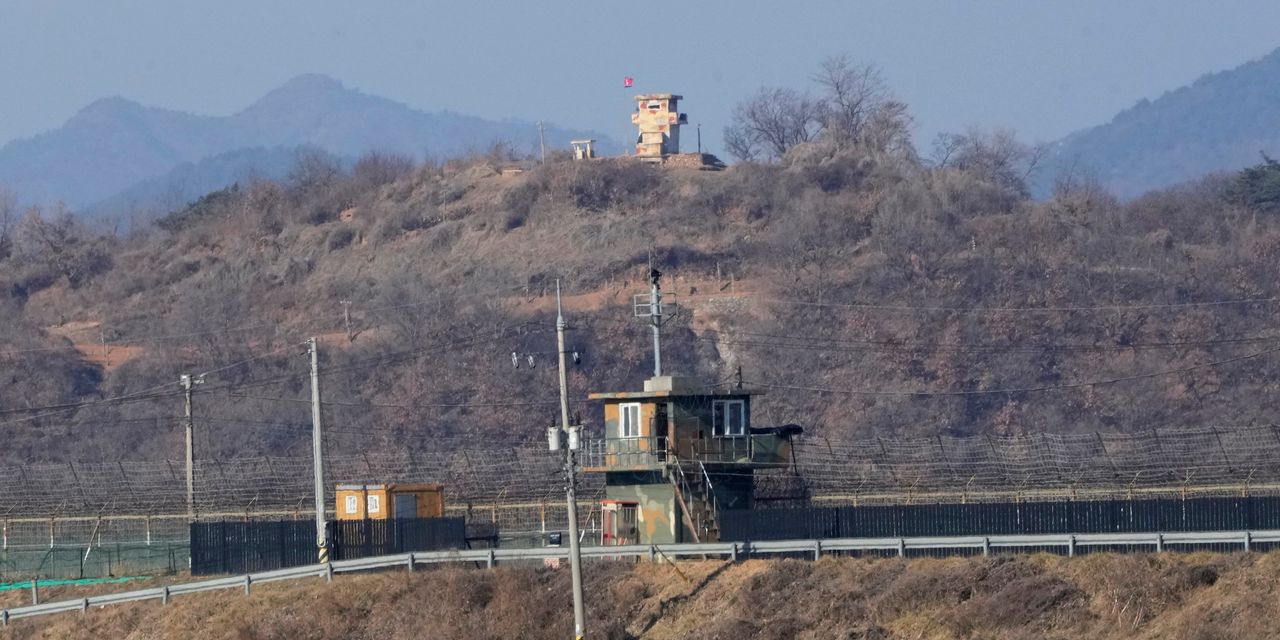
SEOUL—A man who evaded South Korea’s border controls and entered North Korea late last week had used virtually the same route just over a year ago to defect from the Kim Jong Un regime.
There was no evidence that the North Korean defector, a man in his late 20s, had been a Pyongyang spy, Seoul’s military said Monday. He worked as a cleaner and was likely struggling financially, it added.
Late Saturday, the man climbed a tall barbed-wire fence along the inter-Korean eastern border, navigated the heavily fortified Korean demilitarized zone and entered North Korea at 10:40 p.m., Seoul’s military said. South Korea’s military first detected the man hours after he had already entered the DMZ and failed to stop him from fleeing to the North.
Based on surveillance footage, Seoul officials said Monday that they believed the man was the same person who had leapt over a 10-foot-high fence in the same border area and entered South Korea in November 2020. At the time, the man testified to South Korea’s military that he had been a gymnast in North Korea, which the defense ministry couldn’t confirm. The man had also expressed a desire to defect to South Korea.
A series of high-profile border breaches in recent years have raised criticisms in South Korea over the penetrability of the shared border with the Kim regime, which stretches about 150 miles long and more than 2 miles wide. Border troops, barbed wire and minefields guard the DMZ on both sides, while South Korea has high-tech gear to detect movement.
Seoul had sent a weekend message to Pyongyang seeking to ensure the safety of the border-crossing man. On Monday, North Korea acknowledged having received the message but didn’t give a response on the status of the defector, Seoul’s military said. The Kim regime’s borders have remained sealed off throughout the pandemic over Covid-19 fears.
About 34,000 North Koreans have defected to South Korea since the late 1990s. Many flee repressive conditions, which the United Nations has called “systemic, widespread and gross” violations that “may amount to crimes against humanity.”
But life in South Korea presents many challenges. Defectors are targets of investment scams, given their inexperience with banks, ATMs and the financial system. The unemployment rate for defectors stood at 9.4% in 2020, or about triple that of the general population, according to South Korea’s unification ministry. About a quarter live below the poverty line.
The most common jobs for defectors are in the manual labor or services industries, with their monthly incomes about two-thirds of the national average, according to a 2019 survey from the government-funded Korea Hana Foundation, which assists defectors.
Nearly one in every five defectors have thought of returning to North Korea, mainly due to missing their hometown and family, according to a 2021 survey of more than 400 defectors by the Database Center for North Korean Human Rights, a Seoul-based nonprofit organization.
North Korean defectors receive government support, from education to housing to employment, for up to five years after relocating to the South. But defector groups have argued that the assistance is insufficient—and not long enough—given the transition from the Kim regime.
Still, it is rare for defectors to return to the Kim regime. Just 30 North Korean defectors went back to North Korea between 2012 and 2020, according to South Korea’s Unification Ministry.
Write to Dasl Yoon at [email protected]
Copyright ©2022 Dow Jones & Company, Inc. All Rights Reserved. 87990cbe856818d5eddac44c7b1cdeb8
Appeared in the January 4, 2022, print edition as ‘North Korean Previously Defected.’








